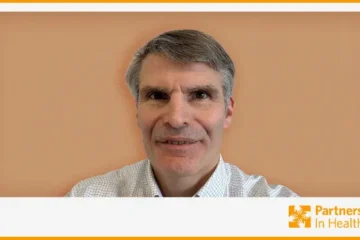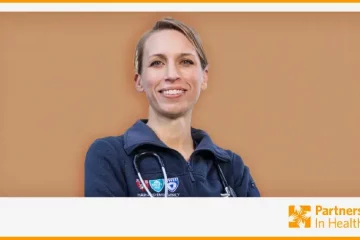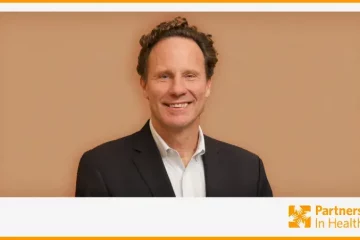Mark Brender: “A Momentous Loss, A Beautiful Legacy”


Mark Brender, Partners In Health Canada’s National Director, wrote a reflection to honour the legacy of Dr. Paul Farmer, published on PIH Canada’s website on March 2, 2022:
“In the flood of stories following Paul Farmer’s death, a long-time Partners In Health physician shared his sense of helplessness after graduating from medical school in Haiti in the early 1990s. He talked about wanting to help people, so badly, and yet he was feeling useless; that was actually the word he used, useless. But Haiti had a dire shortage of physicians and people in need of medical care at every street corner or village market, so how could he have felt himself ineffective?
Before joining PIH, I wouldn’t have had a clue what he was talking about. Now I know my colleague felt helpless because his medical training had the practical value of being handed windshield wipers unattached to an actual car. He passed through clinics or hospitals with no medications or supplies, no electricity or running water, no functioning operating rooms, no referral systems, and no way to treat the wave of HIV and tuberculosis patients who might otherwise come in the door, if only they could afford to get there. He remembers an eight-year-old boy dying of typhoid and a 25-year-old woman dying of malaria because their families couldn’t afford to pay for medications. The young junior physician would return home at night in the company of his grief and futility.
And then my colleague met Paul Farmer working in Cange in Haiti’s Central Plateau, one of the poorest, most rural areas of the country. At the time, Paul was only a few years out of his own internal medicine residency program in Boston. He would often say the back-and-forth between Harvard and Haiti provided him the inspiration and outrage that drove his work: one a place of riches and excellence in medical care and the other of debilitating poverty, where people were socialized not to imagine that better circumstances could be a reality for them.
Paul knew otherwise from training and working at some of the top hospitals in the world. His readings in liberation theology reinforced the belief that patients he saw in rural Haiti, many of whom would become lifelong friends, were as deserving of high-quality medical care as any New York banker. Or more deserving, he would say, because they lived with social injustice as part of their daily existence. His moral brilliance was in not trying to reconcile the irreconcilable, as so many of us do, but in mobilizing a team to do something about it.
Paul was often called an idealist, but that’s like calling Jackie Robinson an African American baseball player; it tells only part of the story. Paul was considered an idealist only because the world wasn’t pragmatic enough, and still isn’t pragmatic enough, to do what’s right for poor people, by making the evidence-based investments that we know will result in dramatically improved outcomes and a safer world for all. “Our patients are our bosses,” is a phrase every PIHer knows, because patients — and by extension, the health practitioners needed to care for them — were Paul’s starting point and his end point. In those early years in rural Haiti, he listened and learned and showed up and failed and tried again, all the while figuring out how to put systems in place that allowed for dignified, compassionate, high-quality care adapted to the actual needs of real patients. The evidence soon followed. “This sounds so rudimentary, but it wasn’t rudimentary to me as a young medical student,” Paul once said. “And it changed me forever, in a good way.”
Under Paul’s vision and leadership, Partners In Health expanded from Haiti to Peru and to Russia, to Rwanda and Malawi and Lesotho, to Liberia and Sierra Leone and beyond. His death has left thousands who knew him personally, and legions more who didn’t, devastated and heartbroken. I knew him for a decade, far shorter than many, and I miss him as you’d miss a parent who was also a best friend, so easily and freely did he share his love.
Through his writing and teaching over the past four decades, Paul left a clear road map for PIH’s work ahead. With 18,000 employees around the world, 99% of them from the countries where we work, PIH’s efforts look slightly different in different places. Yet Paul’s vocabulary is infused everywhere, starting with the 5-S building blocks of a strong health system: staff, stuff, space, systems, and social support. PIH works in close partnership with the public sector, supporting more than 330 public sector hospitals and health centers because it is governments who are responsible for delivering rights for their citizens.
Paul’s vision for equity in health care turned conventional thinking about global health and international development on its head. Where others talked of up-front exit strategies and so-called “sustainability” plans — words that have never crossed any patient’s lips — Paul spoke of long-term accompaniment and open-ended commitments deeply rooted in communities. From those starting points, the plan gets figured out together over time. “[I]f you can harness the quest for personal efficacy into social justice work,” he once told an audience of students, “the good news is that to succeed in this work requires only that you persevere.”
Western conversations about cost-effectiveness drove him crazy, because where poor people were concerned, the debates would boil down to cost; effectiveness was conveniently forgotten when a patient in a faraway place actually needed dialysis or supplemental oxygen or a CAT scan. Of course, he always had to make terrible choices about where to use resources, a challenge PIH and other global health organizations face every day. But far better to be honest about our failures as a global community than to set our standards so low as to cover up what cost-effectiveness arguments are really saying: that some people just don’t deserve the effective part.
As a physician, professor, and anthropologist, Paul had little time for academic discussions that didn’t lead toward an understanding of how to solve real-world problems. When he dove deep into history in his books, that was the purpose. If people didn’t understand that individuals and places were systematically impoverished by structural violence in the form of war, racism, sexism, or greed, they wouldn’t know what needed to be done as a matter of reparative justice. His most recent book, Fevers, Feuds and Diamonds, includes a long historical section detailing hundreds of years of colonial impoverishment, foreign intervention, the propping up of corrupt local leaders, resource-driven conflict, and a complete lack of investment in health institutions designed to serve local populations in Sierra Leone and Liberia. All of this was critical to unpacking why Ebola was able to spread as it did during the 2014-16 pandemic. His editors mentioned the section went on too long, so he happily made it longer.
He always wanted to move faster. He wrote about the ‘House of Yes’, a world in which the response to requests from those in need to do better would be affirmative and unequivocal. Going faster was sometimes called innovative, and so it opened up financial resources that otherwise wouldn’t have existed. This worked for smaller organizations Paul mentored just as it has for PIH. At times, his drive to do more and do better caused risks and organizational stresses, but the stresses were never felt by patients. The risks, as he never failed to remind us, would be worse for patients if we stood still.
I first met Paul at a university speaking event in Montreal in the fall of 2011. I had started as PIH’s first employee in Canada a month earlier. He was surrounded by students after his talk, as always, and having the time of his life. At one point he turned around and looked at me, beaming, and said: “So can you sell this, can you sell this?” I had no idea. He might have given out his email address to half the students that night.
Paul hated leaving people; patients most of all, with students a close second. He loved talking about the work, and the broader PIH community — staff, friends, colleagues, supporters, all of us his lifelong students — loved being around him. On one visit to Toronto in 2017, relaxing at a hotel bar before an evening flight, he was reading part of an early draft of his book, and we listened, rapt, and he ordered another glass of wine, and soon we realized he wouldn’t make it to the airport in time for his flight to Boston. Not that he wanted to. A colleague took out his cell phone and booked Paul on the first flight out in the morning so he could teach his morning class at Harvard.
I’ve never met anyone who made so many people feel so special through their interactions with him, across geographies and social classes. He would be in some fancy reception or meeting with UN officials or politicians, and a minute later would be texting a subsistence farmer patient or colleague an ocean away. He had hundreds of those relationships, maybe thousands, individual conversations kept up over years or decades. As video calls became the norm during the pandemic, Paul would juggle private chat messages with jokes only the recipient would understand. Or a simple ‘Love you, brother.’ In January I sent him a text with a picture of a snowstorm I was stuck in northern Ontario. ‘The great white north indeed!’ he wrote back. ‘Send me up there one of these days.’ He loved winter, and never did well in extreme heat. If asked why he worked in so many hot places, he would say, ‘It wasn’t for the weather!’
The tributes from philanthropists and colleagues and those who considered him a mentor all speak to a once-in-a-generation life cut far too short, a momentous global loss. But I don’t worry for PIH’s future without him. Some people, including me, may have come to PIH over the years because of Paul’s story and magnetism, and a desire to be part of what he built, and they’ll continue to do so – but they stay for the mission. That includes my physician colleague who joined a small Haiti team in 1996 and has never left, training thousands of others in Haiti and Rwanda and beyond, most recently in Immokalee, Florida during the pandemic, because PIH gives him the chance to actually care for people and pass on his knowledge to a younger generation. The movement will continue to grow and blossom, building on successes to show the world what is possible. That was always Paul’s plan.”



